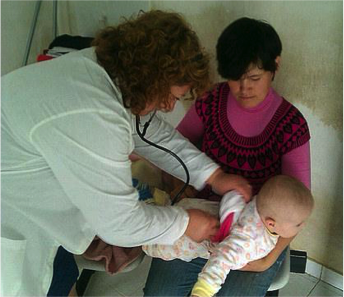
SHARE
Albanians have deep concerns about their country’s health care system. A lack of professionalism among medical personnel, broken or missing equipment, and corruption were among the primary complaints of those who participated in focus group discussions organized by NDI that were held throughout the country this month.
But civil society groups are working to quantify and overcome these challenges by collecting hard numbers on these concerns that will help the government find solutions. They are doing it using a data-collection methodology traditionally used by election observers.
Albania’s transition to democracy has been rocky. Since the fall of communism in 1990, the country of three million has been plagued by economic crisis and partisan conflict that has often derailed efforts to open the political process, promote economic opportunity and move the country toward European Union membership. The public health care system has been particularly problematic.
“If you refuse to bribe the doctors, they will refuse to help you, or you will get very poor service,” said one focus group participant. “I am saying this from my personal experience because I had to bribe them so that I could enter the operating room.”
NDI’s focus group research found that citizens desire greater government oversight and stronger performance standards to remedy the situation.

But effective reform will require a better understanding of the health care system’s underlying problems. NDI’s civic partner, the Coalition for Free and Fair Elections and Sustainable Democracy (CFFESD), has adapted a methodology that it used to monitor polling stations in last year’s parliamentary elections. It is known as sample-based observation (SBO), which refers to the selection of a statistically-relevant sample of primary health centers to which observers are deployed and from which data is collected and analyzed to offer findings that are representative of the health care system as a whole.
On Oct. 16, CFFESD deployed 550 observers to a sample of the country’s 2,216 primary health care centers across Albania. Observations were based on a questionnaire, and results were reported to a call center staffed by 30 volunteer operators.
The assessment looked at whether the centers met legal requirements and quality standards for health center administrators, medical personnel, medical equipment, inventory and infrastructure.
Among the findings:
- Close to 70 percent (67.5) of primary health care centers have proper relationships with a regulatory institution responsible for supervision and audits;
- Only 17 percent of the centers have the proper infrastructure required by Albanian law;
- Slightly more than 50 percent of the centers were properly supplied with medication;
- In 39 percent of the centers, fees for services were not visibly posted; and
- In 13 percent of the centers, there were no services for pregnant women and family planning, as required by law.
As another indication of pending challenges, CFFESD team leader Mirela Arqimandriti noted, “More than 90 percent of centers in Albania are not suited to welcome people with disabilities.”

Pediatric care as observed during CFFESD's day of public health care monitoring.
CFFESD issued two public statements and held a press conference to communicate its findings, which will help shape its recommendations to the Ministry of Health for improving health care services with the goal of ensuring access and effective treatment for all citizens.
The project has received positive feedback from government officials. Albanian Health Minister Ilir Beqaj publicly acknowledged the usefulness of the report, tweeting that the findings will guide the Ministry’s work.
CFFESD’s health care monitoring project is supported by the U.S. Agency for International Development through Assist Impact and enabled by NDI technical assistance.
Published Dec. 22, 2014


